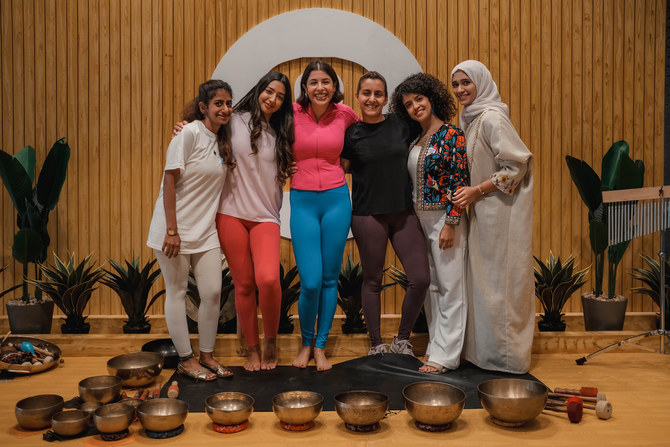JEDDAH: Clothing company Lululemon organized an event prior to International Yoga Day — which takes place later this month — led by Lana Nazer, founder and CEO of Karama Yoga, at Shangri-La Hotel in Jeddah.
The Lululemon ambassador — speaking about “Yoga Flow with Live Music” — said: “With over 1,000 signups for our sessions on this day, I am honored to share something I am passionate about with my community. My aim is for every individual in Saudi Arabia to try yoga at least once to discover a more mindful approach to living.”
Nazer’s signature class showcased a perfect balance for all levels of practitioners, incorporating yoga breathwork, meditation, and dynamic movements to demonstrate that yoga can be both fun and accessible.
She emphasized the importance of making yoga less intimidating for newcomers, while integrating modern living into her teachings.
Nazer expressed her appreciation to the Ministry of Sports for its dedication to promoting yoga and wellness in Saudi Arabia, and noted an increased interest in the country.

Lana Nazer, founder and CEO of Karama Yoga, emphasized the importance of making yoga less intimidating for newcomers, while integrating modern living into her teachings. (supplied)
She said: “I am confident that Saudi Arabia is poised to become a hub for yoga in the future.
“As awareness grows and more individuals embrace this lifestyle, there is ample opportunity for education and introduction to holistic well-being.”
She added that people in the Kingdom were eager to adopt healthier practices, seek balance in their lives, and reduce stress, whether they are working mothers, men, women, or community leaders.
She added: “While we have made significant progress, there is still a considerable journey ahead of us but I’m extremely optimistic.”

Reflecting on the significance of the International Day of Yoga, which takes place on June 21, she said: “It’s a day to celebrate community, mental, physical, and emotional well-being.
“It’s a day to celebrate being happy, healthy, and doing something mindful with people you love. It’s also a celebration of how yoga has changed lives and made a positive impact within communities.”
Khaled Nahfawi, a renowned yoga and meditation instructor, led a guided meditation yoga journey with the use of sound bowls, crystal balls and Tibetan voice.
He said: “The aim is to take people on a journey of relaxation, combining yoga with meditation and the therapeutic effects of sound bowls.
“During my workshop we focused on sound, starting with a brief yoga flow to prepare the body and mind for meditation. Yoga has changed my life, and I’m happy to introduce it to others to potentially change theirs.”
Nahfawi stressed the importance of raising awareness through yoga and meditation, especially among youngsters.
He emphasized the transformative power of mindfulness practices in promoting overall well-being and mental clarity, adding: “As yoga teachers, healers, and meditation instructors, it is essential to elevate awareness, especially among the youth.”
Sarah Hamed attended Nazer’s yoga session and called it “truly transformative,” adding: “Her approach to yoga made it accessible and enjoyable for beginners like me. I left feeling rejuvenated and inspired to incorporate mindfulness into my daily routine.”
























